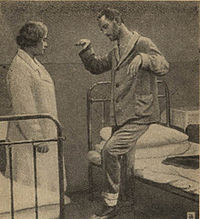
Photo from wikipedia
Patients with locked-in syndrome (LIS) may suffer from pain, which can significantly affect their daily life and well-being. In this study, we aim to investigate the presence and the management… Click to show full abstract
Patients with locked-in syndrome (LIS) may suffer from pain, which can significantly affect their daily life and well-being. In this study, we aim to investigate the presence and the management of pain in LIS patients. Fifty-one participants completed a survey collecting socio-demographic information and detailed reports regarding pain perception and management (type and frequency of pain, daily impact of pain, treatments). Almost half of the LIS patients reported experiencing pain (49%) that affected their quality of life, sleep and cognition. The majority of these patients reported that they did not communicate their pain to clinical staff. Out of the 25 patients reporting pain, 18 (72%) received treatment (60% pharmacological, 12% non-pharmacological) and described the treatment efficacy as ‘moderate’. In addition, 14 (56%) patients were willing to try other non-pharmacological treatments, such as hypnosis or meditation. This study provides a comprehensive characterization of pain perception in LIS patients and highlights the lack of guidelines for pain detection and its management. This is especially pertinent given that pain affects diagnoses, by either inducing fatigue or by using pharmacological treatments that modulate the levels of wakefulness and concentration of such patients.
Journal Title: Diagnostics
Year Published: 2022
Link to full text (if available)
Share on Social Media: Sign Up to like & get
recommendations!